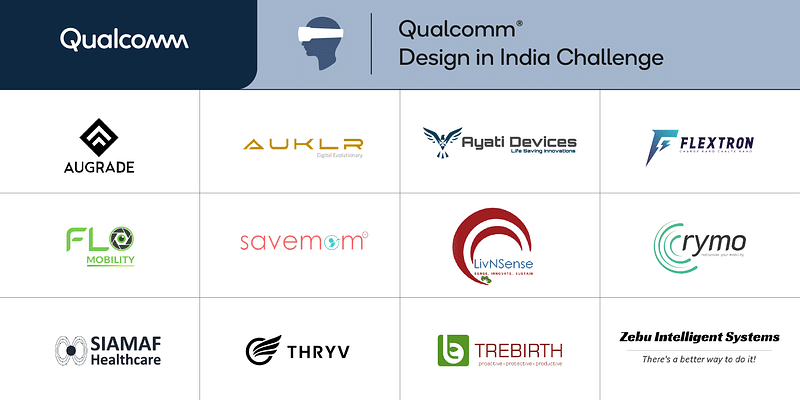
Started in 2016, Qualcomm Design in India Challenge (QDIC) is a Qualcomm India initiative inspired by the incredible potential of smart devices and products that can be built around smart infrastructures, agriculture technology, industrial automation, robotics and drones, medical technology, and rural IoT.
With the Qualcomm Design in India Challenge, the company plans to continue supporting India’s evolving hardware technology ecosystem and spur the innovation of Indian hardware tech startups. Over the years, QDIC has incubated over 89 startups that have filed over 350 patents collectively, launched more than 28 products commercially, and raised over 248 million in capital through various stages of funding. Moreover, six startups have made successful exits via M&A.
The eighth edition of the challenge has received more than 100 applications through outreach partnerships with NASSCOM CoE-IoT and Startup India, and 12 startups were selected for the cohort through a jury selection process.
The startups selected in the final list of QDIC are:
1. Ayati Devices: Incorporated and incubated at SINE, IIT Bombay, Ayati Devices launched the world’s first self-monitoring device for foot neuropathy. The startup is committed to understanding the repercussions of uncontrolled diabetes and helping diabetic patients. The company’s latest offering, Angiocam, a laser-based imaging device for evaluation and quantification of microcirculation, helped it find a position in the final list of QDIC 2023.
2. Savemom: 5G-enabled multi-vital modular medical wearable device is specially designed to monitor pregnant women and children, and provide doorstep antenatal and postnatal care. Savemom aims to reduce maternal mortality by providing personalised healthcare for pregnant women.
3. SIAMAF Healthcare: With a clear goal to develop a better standard of cancer care for all, SIAMAF Healthcare has developed an AI/ML-enabled MafPro device platform for cancer staging, localisation, and margin identification using magnetic particle spectroscopy and magnetic nanotechnology.
4. LivNSense: Aiming to be an enabler for the ‘Factory of the Future’ by addressing Net Zero challenges, LivNSense has developed an industrial IoT and AI platform that serves manufacturing and production industries. Its offerings help businesses lower the cost of operations, improve safety, and reduce energy consumption as well as carbon footprint.
5. Zebu Intelligent Systems: With a mission to enable Industry 4.0 solutions from India, Zebu launched an affordable and adaptable sensor that uses stereo vision & mmWave radar to mimic LiDAR level 3D point clouds and provide autonomy at scale for robotics applications.
6. FLO MOBILITY: To achieve its vision of powering a million autonomous bots across sectors in the next five years, Flo Mobility has developed a generic, cost-effective, and configurable solution to enable the autonomous movement of existing vehicles and equipment in mobility, delivery, warehousing, and farming sectors.
7. Augrade Merge: A B2B productivity AI platform designed to help architectural and real-estate firms create, edit, and present their designs in immersive 3D.
8. Rymo Technologies: To help accelerate the recovery of every person undergoing physiotherapy, Rymo’s Mobi-L is revolutionising physical rehabilitation with robotics and VR technologies.
9. Thryv Mobility: With over 30 years of experience in understanding assistive devices, Thryv Mobility offers a smart scooter board device that enhances mobility, independence, and convenience for wheelchairs and regular users across age groups.
10. Auklr Technologies: Auklr Technologies is developing an innovative and connected digital instrument cluster for automotive use.
11. Marcn Technologies: Making EV changing easier and more accessible with Flextron, a connected DC Ultra EV charger.
12. Trebirth: This startup aims to transform the agri-pest control industry by making a portable scanning kit for early and non-destructive detection of stem borers in grapes (and other crops).
Finalists of the Qualcomm Design in India Challenge 2023 will get access to a lot of benefits, including access to a state-of-the-art innovation lab in Bangalore, dedicated engineering support to develop prototypes, in-depth mentoring workshops, opportunities to participate in various events, an incubation grant of Rs 3.2 lakh, patent filing incentive, and an opportunity to win Rs 1.3 crore in prize money along with access to an Innovation Commercialisation Fund (ICF) of Rs 60 lakh.










